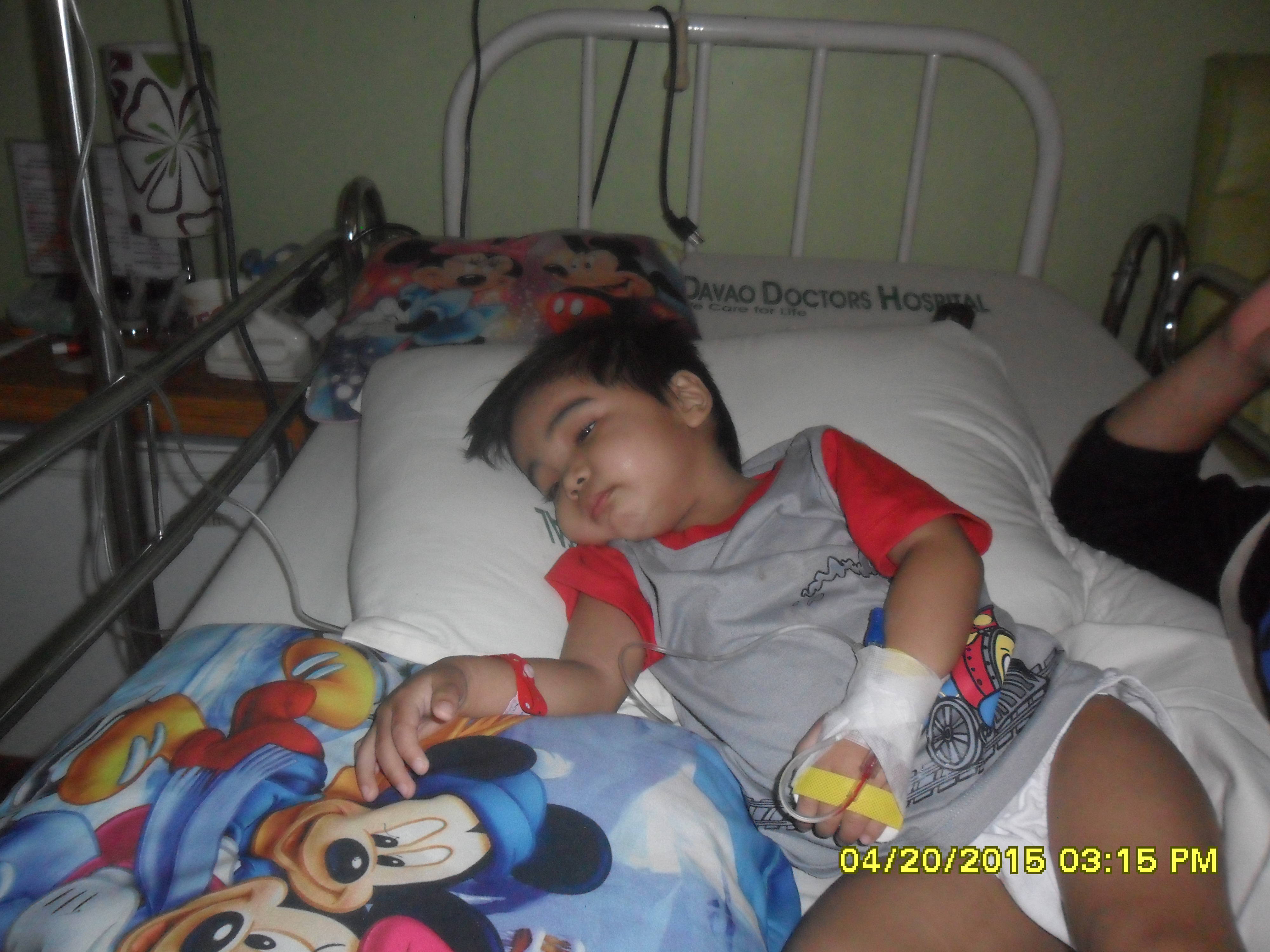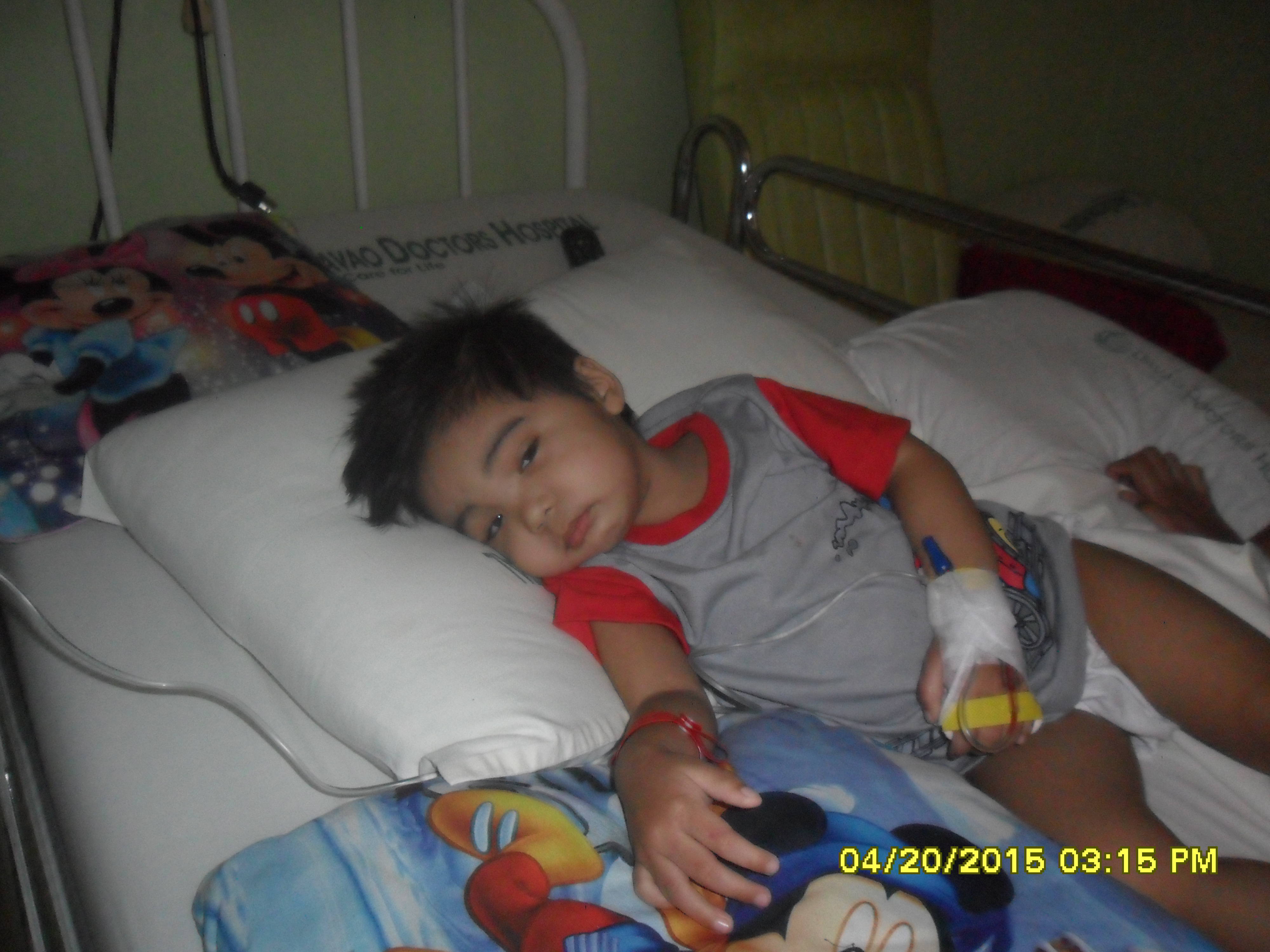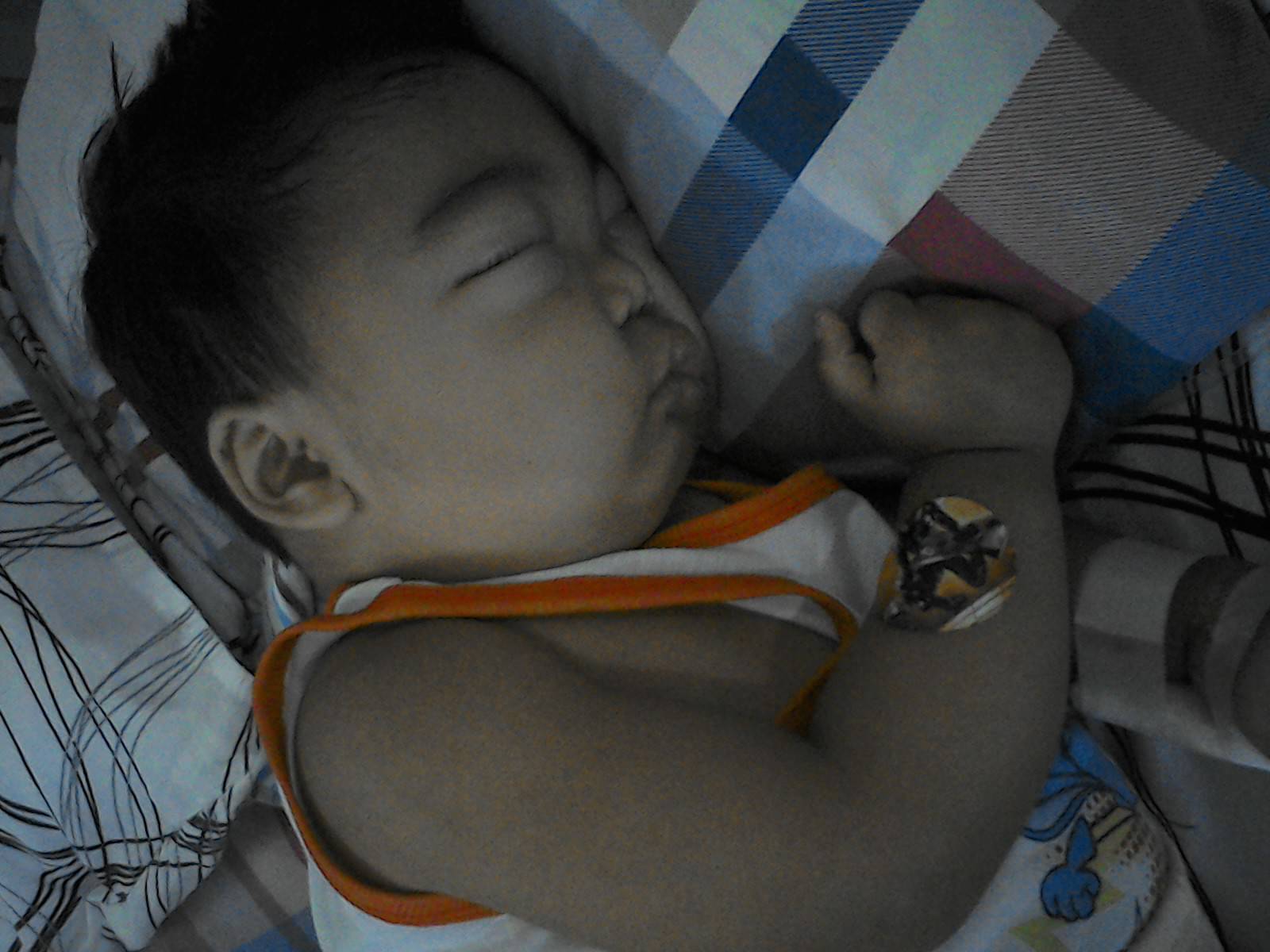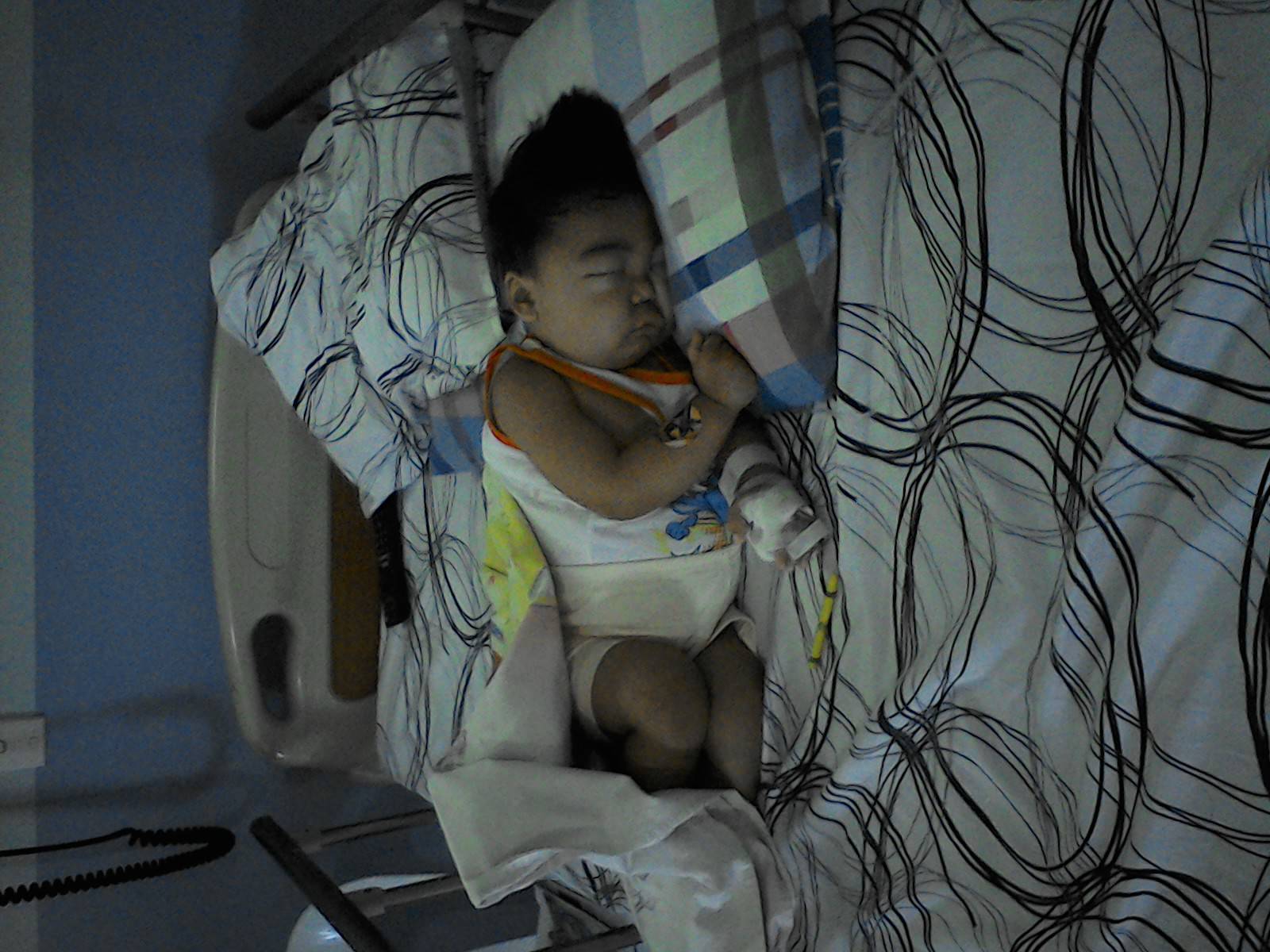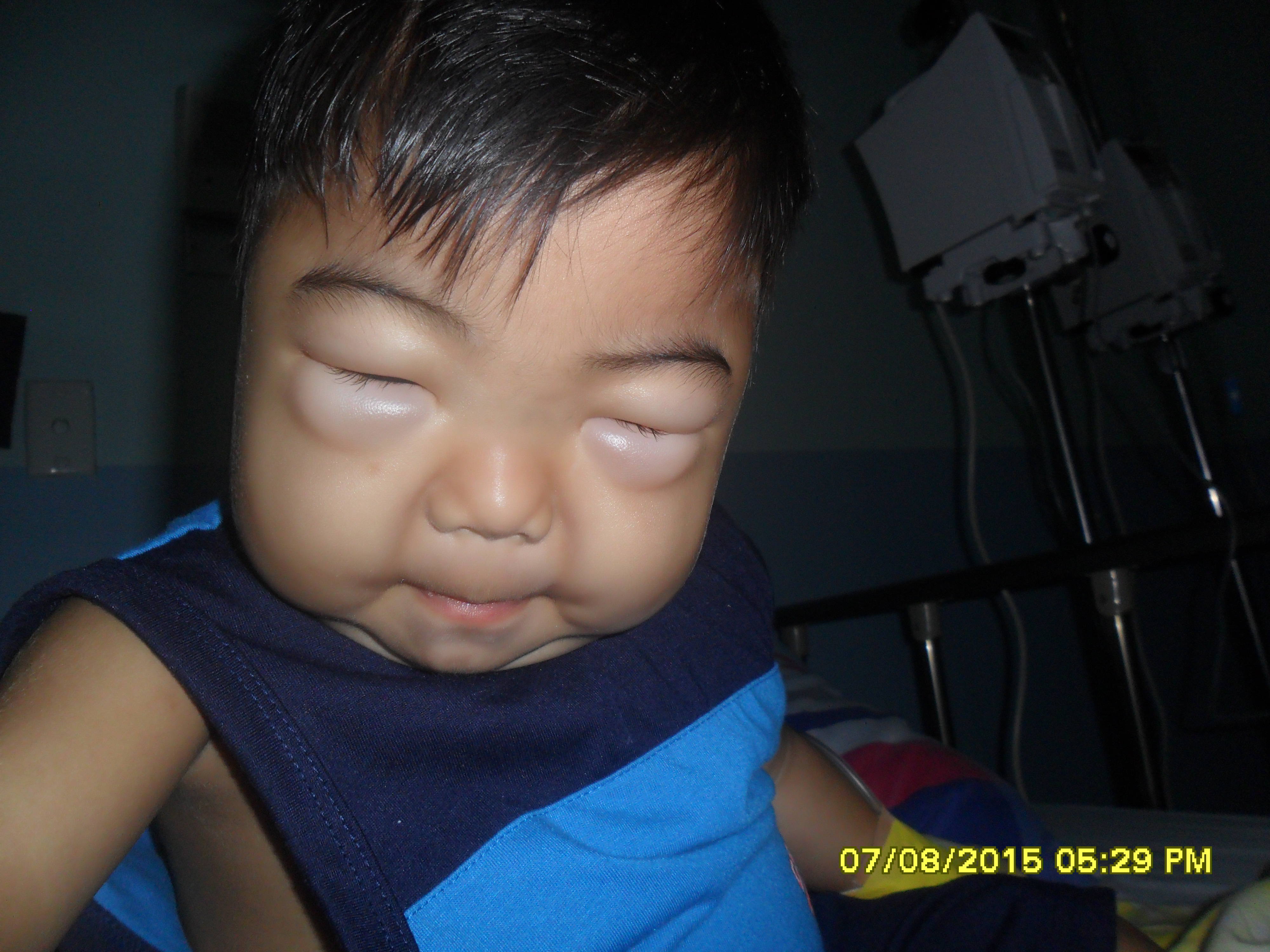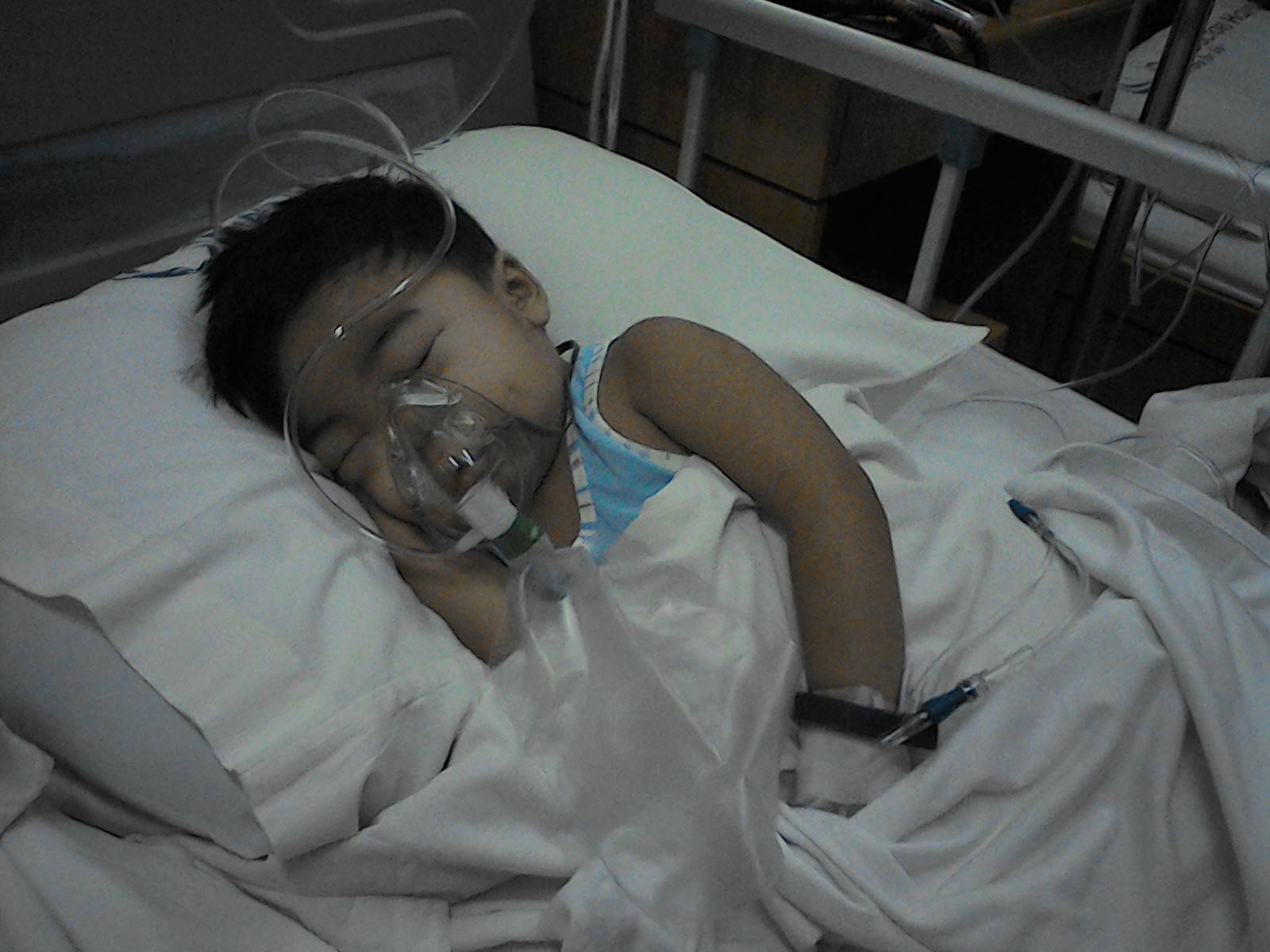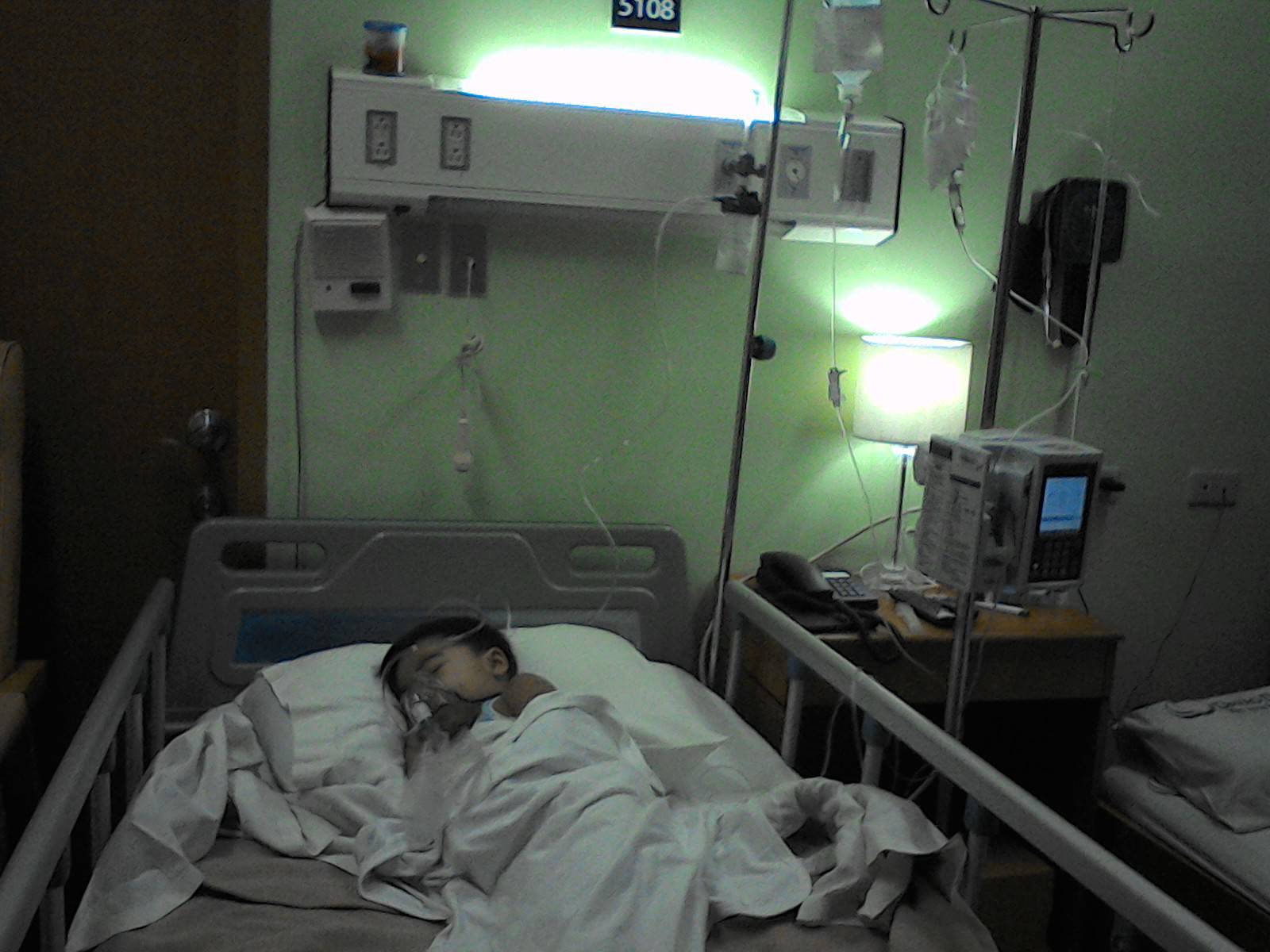Please help save baby Andrew: A plea, a journey of hope and faith
Fundraising campaign by
Merly Escalon
-
₱0.00raised of ₱500,000.00 goal goal
The campaign owner has stopped the page from accepting further donations. Please contact them if you'd still like to donate
Campaign Story
Dear everyone,
I am Merly V. Escalon, 39 years old, a government employee and a single mom to Andrew Miguel V. Escalon. Andrew is a two-year old baby boy who was diagnosed to have a nephrotic syndrom-minimal change kidney disease last November, 2014 thru a kidney biopsy. He underwent steroid medication and treatment but his health condition is not improving. According to his pedia nephrologist, my son's case is considered steroid resistant. In April and May 2015, my son underwent cyclophosphamide (a chemo drug) treatment which compromised his health condition. He is suceptible to infections. From January to present, my son is always confined at the hospital due to infections apart from his kidney disease treatment. These resulted to depletion of my finances. Being a mom, it pains me so much looking at my son helplessly. All i can afford to give him is my love, care and support, that we can do it together with the Grace of the Almighty Father thru His Son, Jesus Christ.
I am asking all of you to please help me, help us in sustaining my son's medication and treatment. Every confinement costs us more than a hundred thousand (in Philippine peso). He still has succeeding medications but don't know already whom to turn to. And one day, a friend of mine referred me to this site. Please be an angel to my son. Please help him.
Please help. Below are my deposit accounts
Account Name - Merly V. Escalon
LandBank of the Philippines Account No. 1016-1777-72
________________________________________________________________________________________
Overview:
What is nephrotic syndrome - minimal change kidney disease?
(https://www.kidney.org/atoz/content/Minimal-Change-Disease)
Minimal change disease (MCD) is a disorder where there is damage to glomeruli, the tiny filtering units in the kidney that remove wastes from the blood. MCD can lead to nephrotic syndrome. As a result, large amounts of protein leaks into the urine, which in turn reduces the amount of protein in your blood, known as proteinuria. You may notice that your urine foams more than usual because of the amount of protein in it. In addition to the lost protein, fluid leaks out of the bloodstream into your tissues, which causes swelling, known as edema. The swelling may be most noticeable in your legs after you have been standing and in the tissue under your eyes when you first get up in the morning. However, it may also occur in other parts of your body and weight gain can result from any fluid retention. In addition to proteinuria and edema, other symptoms may include high blood pressure, high cholesterol, and a higher risk of blood clots.
MCD is more common in children than adults and more frequently found in boys than girls. However, it can still occur in adults.
Although the exact cause of MCD is not known, possible contributing factors may include allergic reactions, use of certain pain killers called NSAIDs, tumors and viral infections.
How is Minimal Change Disease Diagnosed?
A doctor can test your blood and urine to find out if your kidneys are functioning properly. A urine test can check for the amount of protein and other things to indicate kidney damage. A blood test for serum creatinine can be used to calculate glomerular filtration rate (GFR), which tells how well your kidneys are filtering wastes from the blood. Your blood may also be tested for high levels of cholesterol.
A biopsy may be done to confirm a diagnosis. In this test, a tiny piece of your kidney is removed with a special needle, and looked at under a microscope. The damage is not visible under a regular light microscope. It can only be seen under an electron microscope. If a kidney biopsy reveals little or no damage, then a diagnosis of MCD may be made if other symptoms, such as protein in the urine and swelling, are noticed.
How is Minimal Change Disease Treated?
The main treatment for MCD are corticosteroids (often called "steroids"), such as prednisone and prednisolone, which are given to help control the loss of protein in the urine (proteinuria). Steroids can lead to complete remission in most cases. Children with MCD generally respond better to steroids than adults, and relapses are more likely to occur in adults. Relapses can occur in the short term and if this happens more steroids may be given. If steroids do not work, your doctor may suggest other medicines that affect the immune system, such as cyclophosphamide or cyclosporine.
Your doctor may also prescribe certain medicines that are used to lower blood pressure, but may also help reduce the protein in the urine. To help with the swelling (edema), your doctor may also prescribe diuretics (water pills). Reducing dietary salt can also help control swelling.
The vast majority of children and adults recover from MCD and avoid relapses over the long term. Kidney failure is rare in patients with MCD.
________________________________________________________________________________________
Below is my son's medical history for your information and reference.
HISTORY/MEDICATIONS:
- November 10 – 11, 2014 - admitted to Quijano Clinic Hospital because of fever and diarrhea. Diagnosis: Pneumonia, acute gastroenteritis with mod. But because of his bloated condition, we were referred to a pediatric nephrologist at Koronadal City.
- November 11-16, 2014 – admitted at The Doctors Clinic & Hospital, Koronadal City
- January 31 – February 3, 2015 – admitted at The Doctors Clinic & Hospital, Koronadal City
- February 28 – March 05, 2015 – admitted at Davao Doctors Hospital, Davao City
- April 6 – 13, 2015 – admitted at Davao Doctors Hospital, Davao City
- April 19 – 25, 2015 – admitted at Davao Doctors Hospital, Davao City
Diagnosis: Nephrotic Syndrome
Medications:
1.Administration of Two (2) vials of Albumin, 20%, IVTT
2.Ampicin 250mg inj vial
3.Ulcemed 25mg/ml 60ml susp
4.Enalapril, hyspace 5mg tab
5.Lasix 10mg/ml 2ml amp
6.Furosemide 20mg/2ml amp
7.Pred 10 1omg/5ml 60ml susp
(The baby had cough)
Diagnosis: Nephrotic Syndrome Relapse
Administration of One (1) vial of Albumin 20% 50ml
Medications:
1.Ampicin 250mg inj vial
2.Furosemide 20mg/2ml amp
(The baby was complaining of severe stomach pain – bloated condition, comparable with that of the full-termed pregnant woman)
Diagnosis: Minimal Change Lesion cannot rule out focal segmental glomerulosclerosis (Chronic Glomerulonephritis), Nephrotic Syndrome.
Administration of SP Methylprednisone Therapy (1st session)
Medications:
1.INH Comprilex
2.Prednisone 20/5, 7.5ml once every other day
3.Calcium Tums – 1 tum 3x a day
4.Enalapril 5mg, (Renitec) 1 tab once a day
(Follow-up check-up and was still at bloated condition but at minimal range, the doctor advised for a chemotherapy treatment since the baby was considered as steroid-resistant)
Diagnosis: Nephrotic Syndrome in Relapse secondary to Steroid Dependent Nephrotic Syndrome secondary to Minimal Change Lesion.
Administration of: SP Methylprednisone Therapy from April 6-11, 2015 (2nd session)
SP Cyclophosphamide Therapy on April 11, 2015 (1st session)
Medications:
1.Co-Amoxiclav 457 mg/5ml, 3.5ml 2x a day
2.Cyclosporine 25mg/cap, 1 cap (AM) ½ cap (PM)
3.Prednisone 20/5, 7.5ml once every other day
4.Calcium Tums – 1 tum 3x a day
5.Enalapril 5mg, (Renitec) 1 tab once a day
6.Erceflora, 1 polyamp 2x a day
7.Furosemide 40mg/tab, ¼ once a day for 3 days
(The baby was at the state of dehydration because of diarrhea for more than a week, slight fever, very weak physical and health condition)
Diagnosis:
oAmoebic Colitis with Secondary Bacterial Infection
oAcute Gastroentritis with moderate dehydration
oHyponatremia, Hypocalcemia, Hypokalemia, Hypomagnesimia, Hypoalbuminimia
oPediatric Communicable Acquired Pneumnia, Moderate risk
oNephrotic Syndrome in Relapse
Medications:
1.Cefuroxime 383mg IVTT every 8 hrs at 3 doses
2.Cefaclor (ceclor) 250mg/5ml every 12 hours for 2 days
3.Cyclosporine 25mg/cap, 1 cap (AM) ½ cap (PM)
4.Prednisone 20/5, 8ml once every other day
5.Metronidazole 125mg/5ml, 7.5ml every 8 hours
6.Diloxanide Furoate 500mg/tab, .08ml every 8 hrs
7.Hydrasec sachet 30mg, 1 sachet 3x a day
8.Potassium citrate or KCl 10mg/durule, 5 durules per day
9.Calcium Tums 500mg/tab – 1 tum 2x a day
10.Enalapril 5mg, (Renitec) 1 tab once a day
11.Erceflora, 1 polyamp 2x a day
12.Furosemide 12mg IVTT every 8 hours
13.Salbutamol Ventolin Expectorant syrup, 2.5ml 3x a day
- April 27 – May 1, 2015 – admitted at St Louis Hospital for the administration of Four (4) vials of Albumin.
- May 16 – 19, 2015 – admitted at Davao Medical School Foundation Hospital, Davao City
Administration of: SP Methylprednisone Therapy on May 16, 2015 (3rd session)
SP Cyclophosphamide Therapy on May 18, 2015 (2nd session)
Medications:
1.Cyclosporine 25mg/cap, 1 cap (AM) ½ cap (PM)
2.Prednisone 20/5, 7.5ml once every other day
3.Calcium Tums – 1 tum 3x a day
4.Losartan 25mg, 1/2 tab once a day
- May 27 – 30, 2015 – admitted at Dr. Arturo Pinggoy Medical Center
(The baby had a fever with body temp of 39.6 deg C)
Diagnosis: Interstitial Pneumonia
Medications:
1.Zinacef 750mg vial (7 vials)
2.Aeknil 150 mg.ml 2 ml amp ( 3 amp)
3.Furosemide
4.Administration of 2 vials of Albumin, 20%
- July 10 – 19, 2015 – admitted at Davao Medical School Foundation Hospital, Davao City
- On July 24, 2015, my son underwent ultrasound of abdomen, inguinal and scrotum, giving emphasis on the left inguinal canal because the baby was always in pain and crying while pointing to the left inguinal canal. Result of the laboratory shows that, bilateral enlarged kidneys with parenchymal disease, ascites and bilateral hydrocele.
- July 28 – Aug 5, 2015 – admitted at Davao Doctors Hospital, Davao City
(The baby had a fever with body temp of 38.5 deg C)
Diagnosis: Sepsis, Urinary Tract Infection & Infectious Disease Secondary to Fungal Infection
Blood transfusion was administered, the hemoglobin of the baby dropped to 69
Administration of Four (4) vials of Albumin 25% 50 ml.
Administration of: SP Methylprednisone Therapy on May 16, 2015 (4th session)
The patient was placed under reverse isolation.
Medications:
1.Cyclosporine 25mg/cap, 1 cap (AM) ½ cap (PM)
2.Prednisone 20/5, 2.5ml once every other day
3.Calcium Tums – 1 tum 3x a day
4.Enalapril, renitec 5mg – 1/2 tab once a day
5.Aspilet 80 mg – 1 tab once a day
6.Erceflora 25mg
7.Sangobion syrup – 5ml once a day
8.Folic Acid – 2 ml once a day
9.Amikacin 90g, IVTT
10.Medixon 1 g
11.Meromax 380g, IVTT
12.Flucorazole 40g
Advised to still observe protective environment upon discharge.
(The baby was complaining of chest pain – the baby was crying and was complaining that he was in pain while pointing to his heart. The doctor immediately advised for some laboratory test – ECG, CPKMB and CBC. Based on the laboratory result, the doctor advised for confinement.)
The baby underwent some more laboratory tests – 2d echo, troponin & BNP test. The baby was closely monitored since the heartbeat dropped at 61. Advised to transfer to ICU but we declined/refused the request due to financial constraints. Instead, I personally monitored the heart condition of the baby 24/7 and immediately informed the nurse on duty if found some irregularities on heart & pulse rates.
Result:
|
Test |
Date |
Result |
Range |
|
BNP |
July 30, 2015 |
557 |
0-150 |
|
Aug 01, 2015 |
168 |
0-150 |
|
|
CPKMB |
July 28, 2015 |
79.80 |
9-22.8 |
|
July 30, 2015 |
59.50 |
9-22.8 |
|
|
Aug 01, 2015 |
84.2 |
9-22.8 |
|
|
Aug 03, 2015 |
81.70 |
9-22.8 |
Diagnosis: Myocarditis & Lower Respiratory Tract Infection
Medications
1.Dopamine drip at 8mcg/kg/hr
2.Dogoxin (Lanoxin elixir) 1 ml Q12hrs
3.Paracetamol 250mg/5ml 3 ml for fever
4.Albumin 25% ½ vial s/p 6 doses (administered 3 vials)
5.Furosemide 13mg
Follow up check-ups were made on the dates August 10 & 22, 2015 with CKMB results of 60.70 and 68.70 respectively. The baby is due for check-up on the second (2nd) week of September, 2015 but was not able to subject my son to such medication due to financial constraints.
My son’s health and life conditions are at high risk. My son is only two (2) years old and he needs my love and care in this dark and struggling stage of his life.
Organizer
- Merly Escalon
- Tacurong City, PH
LABORATORY TESTS
Update posted by Merly Escalon at 10:12 amLABORATORY TESTS DONE FOR MONITORING: Date Test Sub-code Result Range Nov 11, 2014 Urinalysis Protein 4+ Negative Pus Cells 8-10/hpf 0-3/hpf RBC 4-8/hpf 0-2/hpf Nov 12, 2014 Urinalysis Protein 3+ Negative Pus Cells 8-12/hpf 0-3/hpf RBC 20-25/hpf 0-2/hpf Dec 20, 2014 Urinalysis Protein 4+ Negative Pus Cells 20-25/hpf 0-3/hpf RBC. . . . .
July 28 update
Update posted by Merly Escalon at 05:34 pmJuly 28, 2015@ around 4pm, my son was crying in pain while pointing to his heart. I immediately informed his doctor about the complain, and instructed to visit the hospital for some laboratory test. ECG, CPKMB and CBC. Confined at around 9pm.Result:CBC - hemoglobin count still below the normal range


.jpg)
